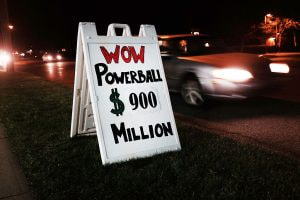Can AI Create an Oscar-Winning Film Script?
Picture a movie not made by renowned directors or seasoned screenwriters but by the mechanical mind of artificial intelligence (AI). Weird, right? But not as futuristic as you may expect.
In a bid to test whether AI could create the ultimate Oscar-winning film, we enlisted the help of ChatGPT (a sophisticated language model) to write a movie script with all the elements to rival even the most celebrated past winners of the Golden Statuette.
To make this happen, we handpicked 250 cinematic accolades by exploring the archives of Oscar winners for Best Picture, Best Director, Best Screenwriter, Best Actor, and Best Actress across five decades, and fed these into ChatGPT.
The result? Worlds Within.
Introducing ‘Worlds Within’: AI’s bid for Oscar stardom

An AI-generated poster for the ChatGPT-generated movie.
Worlds Within, a movie script written entirely by the AI tool ChatGPT, is a captivating sci-fi dystopian thriller that delves deep into human emotions.
There’s no denying that sci-fi provides a rich canvas for exploring deep themes and societal issues, so it’s perhaps unsurprising that ChatGPT chose this particular movie genre when writing its ‘Oscar-worthy’ script.
Critically acclaimed films like ‘Blade Runner’ and ‘The Matrix’ show how the dystopian backdrop can be used to explore humanity, morality, and identity. The genre also allows for boundless creativity, with ample opportunities for visually stunning effects, world-building, and storytelling, as showcased in the film poster mockup also generated by AI.
Recent Oscar winners like ‘Get Out’ and ‘Parasite’ prove that audiences and Academy voters appreciate genre-bending works that challenge traditional categories. By blending elements of sci-fi and dystopia, a film can break free from genre conventions and provide a new outlook on familiar themes. This approach enhances its appeal and increases the potential for critical acclaim.
What does the script look like?
To give a flavour of the film script, here’s an extract from the AI-written content:
“In a society dominated by a government-controlled emotion-suppressing technology, our rebellious protagonist, Aria, accidentally stumbles upon a hidden archive containing genuine human emotions. Stricken by the raw authenticity of these forbidden emotions, Aria embarks on a perilous journey to expose the truth to the world.
As she unveils the suppressed emotional spectrum, Aria becomes a symbol of resistance, sparking a revolution against the oppressive regime. The film delves into the intricate dynamics of human connection and self-discovery as individuals, liberated from emotional constraints, grapple with the complexities of love, fear, and joy.”

The idea of a society controlled by emotion-suppressing technology taps into modern worries about surveillance, censorship, and government authority. It’s a timely exploration, given today’s focus on individual freedoms and independence.
Furthermore, depicting a world without genuine emotions alongside the rediscovery of those feelings provides striking visuals and a compelling story. Exploring emotions like love, fear, and joy in such a stifling setting will surely provoke strong emotional reactions from the audience and intrigue the judging panel.
AI predicts the best actors and actresses at the Oscars
Best Actor
AI predicts that Joaquin Phoenix will emerge as the frontrunner for the Best Actor role. Renowned for his talent and recognised with four Oscar nominations, Phoenix’s triumph as the iconic ‘Joker’ character further solidifies his standing as one of the greatest actors of our time.
Phoenix’s ability to embody complex characters with depth and authenticity, coupled with his transformative performances, makes him an ideal choice for the lead role in the envisioned dystopian thriller.
Best Actress
Frances McDormand garners the AI’s favour as the top choice for Best Actress. With an illustrious career marked by eight Oscar nominations and three wins for ‘Nomadland,’ ‘Three Billboards Outside of Ebbing, Missouri,’ and ‘Fargo,’ McDormand stands second only to Katharine Hepburn for the most wins in this category. Her raw, emotive performances and ability to portray characters with nuance and depth make her a standout choice for the emotionally charged narrative of the film.
Best Supporting Actor/Actress
In supporting roles, AI picks Gary Oldman as the top choice for Best Supporting Actor. Oldman’s body of work makes him a great fit alongside Phoenix. Similarly, Cate Blanchett is the AI’s top pick for Best Supporting Actress. Known for her versatility and ability to elevate any role, Blanchett’s potential win adds depth and interest to the expected cast lineup.
Best Director
In a groundbreaking move, AI names Chloe Zhao as the Best Director. Zhao previously claimed the coveted award in 2021 for her direction in ‘Nomadland’, a film celebrated for its poignant storytelling and captivating visuals (strangely enough, also featuring McDormand). Her win marked a historic moment, as Zhao became the first woman of colour, and the second woman ever, to win the Best Director Oscar.
Despite the critical reception of her most recent film, Marvel’s ‘The Eternals’, which currently holds a 47% rating on Rotten Tomatoes, Zhao’s popularity and impact on contemporary cinema remain undeniable. Her unique storytelling style and ability to capture the essence of human experiences resonate deeply with audiences worldwide.
What are the odds of these actors winning an Oscar?

With the awards fast approaching, the odds for betting on the Oscars continue to fluctuate daily. Let’s take a closer look at each AI nominee to better understand their chances of winning and whether ChatGPT’s predictions are accurate.
Joaquin Phoenix
With four nominations and one win across his acting career so far, Phoenix has a win percentage of 25%. His presence in the Oscar arena reflects the competitiveness of the categories he’s nominated and the acclaim he’s garnered for his performances.
Gary Oldman
Boasting three nominations and one win means Oldman has a win percentage of 33%. Known for his versatility, each nomination underscores Oldman’s ability to excel across various roles, making him a strong contender.
Frances McDormand
McDormand stands out with a win percentage of 50%, having won three out of her six nominations. This highlights her consistent excellence and the industry’s recognition of her talent over the years.
Cate Blanchett
With a win percentage of 25%, Cate has earned eight nominations and secured two wins throughout her career. Despite winning only two out of eight, her performances in ‘Blue Jasmine’ and ‘The Aviator’ solidify her status as one of the most distinguished actresses of our time.
Chloe Zhao
Holding a flawless win record of 100% from her one nomination, Chloe is in a unique position. Her success with ‘Nomadland’ not only showcases her talent but also the industry’s acknowledgement of her as an influential filmmaker.
Following our analysis, Frances McDormand is the most successful among the AI’s actor picks, having won half her six acting nominations.
On the other hand, Cate Blanchett and Joaquin Phoenix are risky predictions, as they have only won one out of every four nominations they’ve received.
Should screenwriters be worried?
Given the current discussion about AI-generated content and its impact on filmmaking, the influence of AI on cinema is hard, if not impossible, to predict. Naturally, this causes apprehension within the industry.
Whether AI is capable, or will ever be capable, of writing film scripts to the same quality as the human race is a hotly debated topic. And its ability to win an Oscar is just as subjective.
That said, between cliche dialogue and not giving Oldman’s character a unique name (resorting to ‘Gary’), it looks like screenwriters can assume their jobs are safe for now…
But, despite the worries, there is something quite thrilling about its potential. AI could help to streamline film production tasks (like editing and special effects) to make filmmaking more affordable and accessible to independent creators, as well as allow us to experiment with storytelling concepts and techniques in ways never seen before.
Methodology:
- BestBettingSites.com sourced Oscar winners for Best Picture, Best Director, Best Screenwriter, Best Actor, and Best Actress from the last 50 years from Wikipedia.
- The list of 250 awards was given to ChatGPT.
- We requested AI to create a film that had the potential to win all respective awards, including a primary cast list, a synopsis, an example of a scene, and a title.



